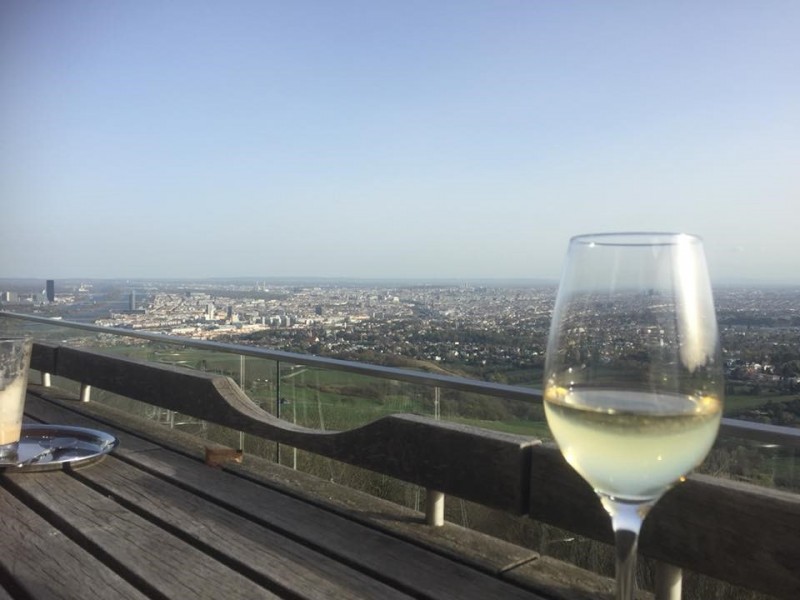Science and Sunshine at EGU in Vienna
Peter Sheehan
UEA

I had been to EGU before – in 2017 – so I was prepared for the sheer size of the meeting: the boards around the conference centre counting up the presentations as the week wore or, eventually settling on almost 10,000. But I think it must be a sign of having been in science for that bit longer now, of starting to find my way that bit more confidently, that I seemed to keep bumping into people I know – and, because I’m in the final year of my PhD, asking them for a job.
My presentation this year is PICO: a two-minute, quick-fire introduction to your work delivered to an assembled audience, followed by an interactive slideshow presentation delivered one-to-one, or to a small group, much like a traditional poster pitch. The key difference is that, thanks to the judicious use of hyperlinks and the like in the interactive slideshow, you can skip back and forth between slides and figures, focussing only on what attendees are interested in. I confess: I was initially sceptical. The PICO was not a format of presentation I have tried before and, from hanging around a couple of last year’s presentations, I remained to be convinced. I was, in fact, wrong. PICOs are a fantastic innovation that combine the best features of both traditional poster and oral presentations. You talk to each attendee about only the things they are interested in, so potentially they get more detail than they would from an oral while spending less time sitting through material that isn’t of interest. And the two-minute introductions eliminate my least favourite of conference rituals: hanging around awkwardly at someone’s poster, skim reading to see if you’re interested while at the same time seeming sufficiently non-committal that you can plausibly skip away if it turns out there’s not much there for you. People know what you’re work is about and they know whom they want to talk to from the get go.
The second novelty of this year’s conference was being a co-convenor for a session. I arrive first thing, bright-eyed and clutching a coffee, to have the microphone thrust into my hand: “Off you go: convene!” It looks like I’m chairing the first part of the session. I am all of a sudden acutely aware of the optics, in this heady age of Brexit-related antagonism, that a British national mangling names in languages other than English would not look particularly good. I submit to repeated study of the names on the list, muttering them under my breath and hoping that no-one’s paying me too much attention. In the end, I flatter myself that I manage OK – at least, I don’t notice any funny glances, and no-one upbraids me afterwards. I head off into the hills over Vienna for what I hope is a well-earned glass of wine…
I benefitted greatly from my participation in EGU, and I am grateful to the Challenger Society for helping to fund my trip.
Profile
I am in the fourth and final year of my PhD at the University of East Anglia in Norwich, where I do research on the long- and short-term variability of the Fair Isle Current, one of the most important inflows of Atlantic water into the North Sea. I use data from CTD profiles and from Seagliders, so optimal interpolation onto a common grid has become a big part of my life. My project is jointly supervised by Marine Scotland, so I have spent a lot of time in sunny Aberdeen.
Latest News
Royal Society Publishing Photography Competition 2025
Please see a message from the Royal Society below:
We are delighted to announce that the 2025 Competition is now open for entries until 15 August for a chance to win £1000! The competition celebrates the power of photography in conveying the wonder of science happening all around us and photographs can be submitted in the categories of: Astronomy, Behaviour, Earth Science and Climatology, Ecology and Environmental Science, and Microimaging.
The competition is free to enter and open to anyone studying or working in science at graduate level or above. Category winners will receive a one-year membership to the Royal Photographic Society and the overall winner will receive a grand prize of £1,000. Find out more: https://bit.ly/RSPphotocomp
October 2025 MEDIN Workshop: Marine Data Management, Governance and the MEDIN toolset
The Marine Environmental Data and Information Network (MEDIN) are pleased to announce that registration is now open for the next occurrence of our popular free online training workshop: ‘Marine Data Management, Governance and the MEDIN toolset’ on the 13th – 17th October 2025 on OceanTeacher Global Academy.
Marine Data Management, Governance and the MEDIN toolset
The Marine Environmental Data and Information Network (MEDIN) and OceanWise are delighted to invite you to attend our popular free online training workshop: ‘Marine Data Management, Governance and the MEDIN toolset’ on the 19th – 23rd of May 2025.
